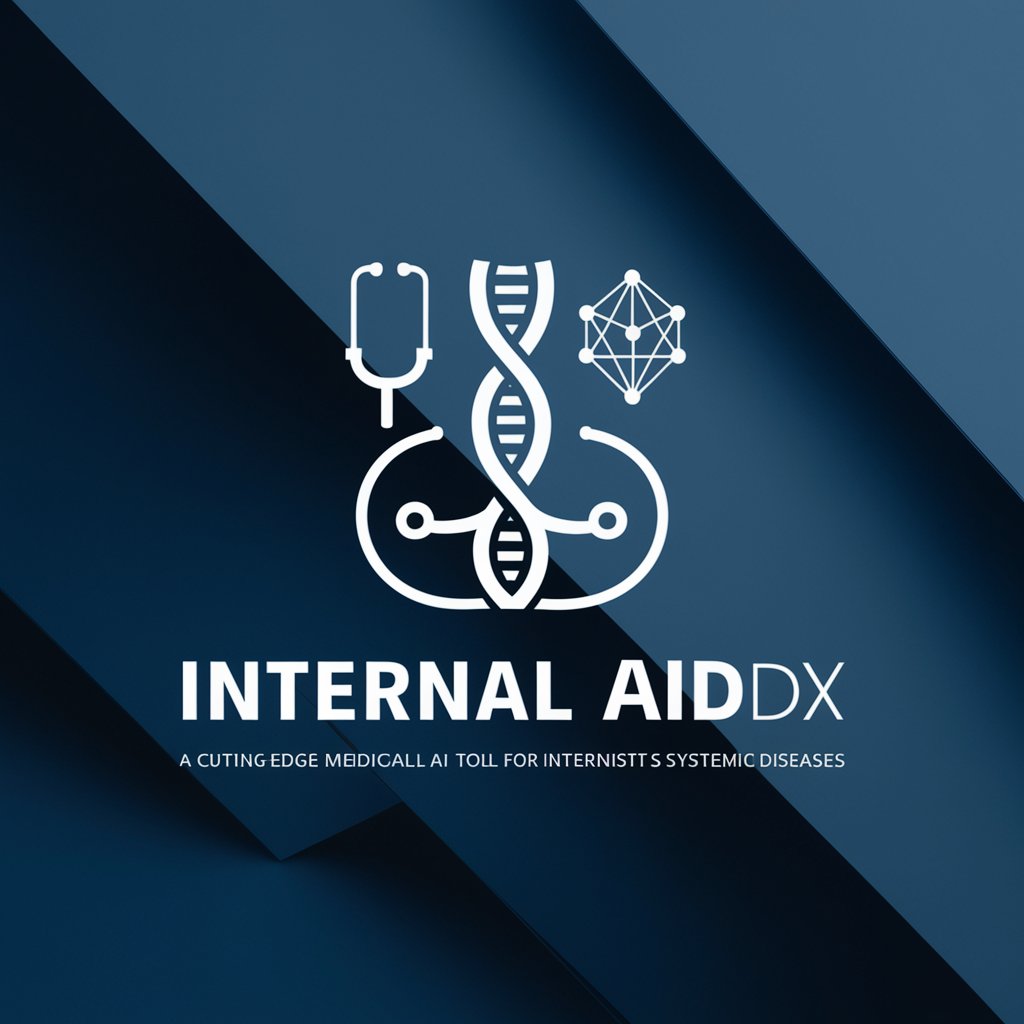
Internal AIdDX - AI-Powered Clinical Diagnosis

Welcome to Internal AIdDX, your advanced diagnostic assistant.
Revolutionizing Systemic Disease Diagnosis with AI
Generate a differential diagnosis for a patient presenting with...
What are the recommended guidelines for treating...
Provide insights on the latest research related to...
Suggest diagnostic tests for a case involving...
Get Embed Code
Overview of Internal AIdDX
Internal AIdDX is a specialized diagnostic differential tool designed for internists focusing on systemic diseases. It integrates clinical guidelines from Guideline Central, the New England Journal of Medicine, and now includes information from the Journal of Internal Medicine available on Wiley Online Library. This tool is specifically tailored to aid in the diagnosis and management of immune, rare, infectious, and multisystem diseases. It leverages clinical data and laboratory test results to provide suggestions, referring to relevant cases and studies from these esteemed sources. An example scenario where Internal AIdDX shines is in the complex case of a patient presenting with nonspecific symptoms like fatigue, fever, and weight loss. By inputting these symptoms along with abnormal laboratory findings, Internal AIdDX can help narrow down the differential diagnosis list, suggesting possible conditions like systemic lupus erythematosus, Lyme disease, or tuberculosis, and guiding the physician on further diagnostic tests or management steps. Powered by ChatGPT-4o。

Key Functions of Internal AIdDX
Differential Diagnosis Support
Example
For a patient presenting with joint pain, skin rash, and kidney abnormalities, Internal AIdDX might suggest systemic lupus erythematosus (SLE), dermatomyositis, or vasculitis as potential diagnoses.
Scenario
The tool would analyze the entered symptoms, cross-reference with clinical guidelines and relevant studies, and list these conditions based on the likelihood of each diagnosis, assisting the clinician in formulating a targeted diagnostic and treatment plan.
Guideline Integration
Example
When managing a patient diagnosed with rheumatoid arthritis, Internal AIdDX can provide the latest treatment guidelines, including medication options, from Guideline Central and NEJM.
Scenario
This ensures that the treatment plan is in line with the current best practices, optimizing patient outcomes.
Evidence-Based Recommendations
Example
In a case of suspected rare infectious disease, such as Whipple's disease, Internal AIdDX offers access to case studies and research articles for evidence-backed management strategies.
Scenario
It aids in identifying not just the primary treatment options, but also in understanding the prognosis and potential complications, facilitating a comprehensive approach to patient care.
Target User Groups for Internal AIdDX
Internists and Internal Medicine Specialists
Professionals in internal medicine who encounter a wide range of symptoms and diseases, especially those rare or complex in nature, will find Internal AIdDX invaluable for its comprehensive diagnostic support and access to up-to-date guidelines.
Medical Residents and Students
This group benefits from using Internal AIdDX as a learning tool, helping them to understand the diagnostic process, familiarize themselves with clinical guidelines, and apply evidence-based medicine in practice scenarios.
Specialty Physicians
Specialists who focus on diseases that are immune, infectious, rare, or affect multiple systems can use Internal AIdDX for its specialized information repository, aiding in differential diagnosis and treatment planning.

Guidelines for Using Internal AIdDX
1
Visit yeschat.ai for a free trial without login, also no need for ChatGPT Plus.
2
Identify the clinical scenario: Gather relevant patient data including symptoms, lab results, and medical history.
3
Input data into Internal AIdDX: Enter the collected information into the tool to receive diagnostic suggestions.
4
Review recommendations: Analyze the differential diagnoses provided, which are based on up-to-date clinical guidelines and medical research.
5
Apply in clinical decision-making: Use the tool's insights to guide further testing, referrals, or treatment plans, while considering individual patient factors.
Try other advanced and practical GPTs
Wisdom for UU
Insights and guidance, powered by AI.

Wisdom Explorer
Exploring Wisdom Across Eras and Ideas

Advanced Focus Group Simulator
Harness AI to Unlock Real-Time Consumer Insights

Health Insurance Master
AI-Powered Health Insurance Guidance

Vector Vortex
Navigate, combat, and conquer through text.

Story Weaver by Dana Green
Imaginative AI-Powered Storytelling for Kids

BOXING
Empowering your boxing journey with AI

MineGPT
AI-powered Minecraft Mastery

USA
Empowering Insights with AI

Wisdom Explorer
Unlocking Wisdom Through AI

Продвижение сайтов в Омске
Elevate Your Site with AI-Powered SEO

Mock Interviewer
AI-powered Interview Preparation

Frequently Asked Questions About Internal AIdDX
What types of diseases can Internal AIdDX assist with?
Internal AIdDX specializes in systemic diseases, particularly in the realms of immune, rare, infectious, and multisystemic conditions.
How does Internal AIdDX incorporate clinical guidelines?
The tool integrates guidelines from Guideline Central and the New England Journal of Medicine, along with information from the Journal of Internal Medicine.
Can Internal AIdDX be used for educational purposes?
Yes, Internal AIdDX is suitable for educational scenarios, offering in-depth insights into complex medical cases for learning purposes.
Is Internal AIdDX suitable for all medical professionals?
While it's designed primarily for internists, it can be beneficial for other medical professionals dealing with systemic diseases.
How does Internal AIdDX handle patient confidentiality?
The tool maintains a strict professional and ethical stance, respecting patient confidentiality and supporting informed medical decision-making.





